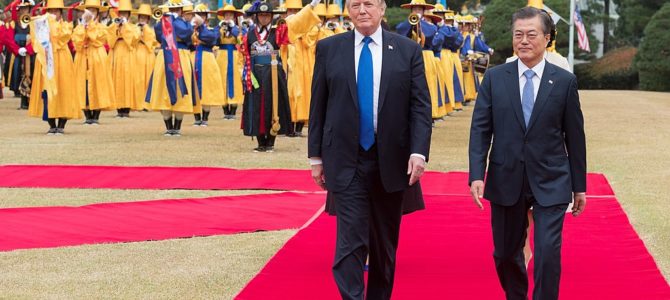
On May 10, President Trump celebrated the release of three American prisoners from North Korea. South Koreans cheered alongside, seeing this as another event in a long chain of welcome developments.
These days, South Koreans are enjoying feelings of relief and optimism that most have never known in their lifetimes. After more than six decades of a constant existential threat, a peaceful relationship with North Korea finally seems in the realm of possibility, even if it is still distant.
In April, denizens of Seoul spent many hours glued to the television, jaws dropped, watching the historic meeting of North Korean dictator Kim Jong-un and the South Korean president, Moon Jae-in, in the demilitarized zone. It was surreal to see them together, holding hands, smiling and cracking jokes. While watching Kim chivalrously hold the door open for the first lady and hearing him say North Korea does not need nuclear weapons, people rhapsodized, “Is this real or is this a dream?”
Korean conservatives are cautious. Most acknowledge there is a long way to go before Kim takes concrete and verifiable actions toward denuclearization. Even so, the recent meeting of the leaders, as well as the upcoming Trump-Kim summit in Singapore, represent progress that most South Koreans assumed would be impossible to see in our lifetimes.
As an American living in Seoul, I am struck by the disparity between the United States and South Korea in public portrayals of President Trump’s role. Plainly, the outpouring of goodwill and gratitude toward him in Seoul would surprise most Americans.
Korean opinion writers and TV pundits lavish praise on Trump, attributing tactical brilliance and bullish confidence. The same qualities that used to invite mocking—his temper, propensity for spontaneous tweeting, grandstanding—are now interpreted as the bracing medicine to shock the region out of its longstanding ills.
Above all, Koreans are grateful that this American president dared to take risks to move the needle on North Korea, which many previous administrations miserably failed at. “President Obama never did anything for us” is a frequent refrain of people who were disillusioned by the 44th president’s doctrine of “strategic patience.”
Now, I wonder: is the American mainstream media being myopic in its failure to highlight the president’s positive influence on Asia? Or does it hold a greater commitment to continuing to paint the president as an incapable buffoon?
Even if we were to account for the fact that domestic news coverage tends to drown out international news, the disparity in tone is shocking. Sen. Lindsey Graham’s suggestion that Trump be awarded the Nobel Prize for his handling of North Korea met a lot of derision in the United States. The New York Times opinion page likened the president to a “wildly hirsute cartoon figure.”
It has been a long time since Trump was seen as a joke in Korea. In fact, according to a poll conducted by the newspaper Dailian and published on May 9, four out of ten South Koreans believe Trump deserves the peace prize, a statistic that would probably astonish most Americans. At the time of writing, entering “Trump” on Naver.com, South Korea’s top search engine, yields the top suggested search of “Trump Nobel Prize.”
To be sure, the tide of public opinion is fickle and doesn’t account for much. But it can reveal the patterns and consequences of influence. The progressive South Korean president, Moon, had a key role in shaping the way the public sees Trump.
Since inauguration in 2017, Moon has deliberately painted Trump as an important ally in normalizing inter-Korea relations. Even given his success in inviting Kim for amiable talks, Moon has consistently deflected praise, saying that most of the credit for any progress, as well as the Nobel Peace Prize, should go to President Trump.
Many see this as a strategy to stoke Trump’s famous ego, getting him to play along with the agenda. Be that as it may, what we see in Korea now is unprecedented progress toward peace, and both conservatives and progressives (who are usually defined by their anti-American stance) united in regarding Washington as an ally.
The plain fact is that no other American president has come close to achieving these things in Korea. Past Republican and Democratic administrations have been similarly unambitious and inert. I don’t know about the Nobel prize, but how about giving Trump some credit where it is plainly due? Koreans are happy to.









